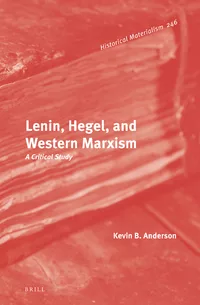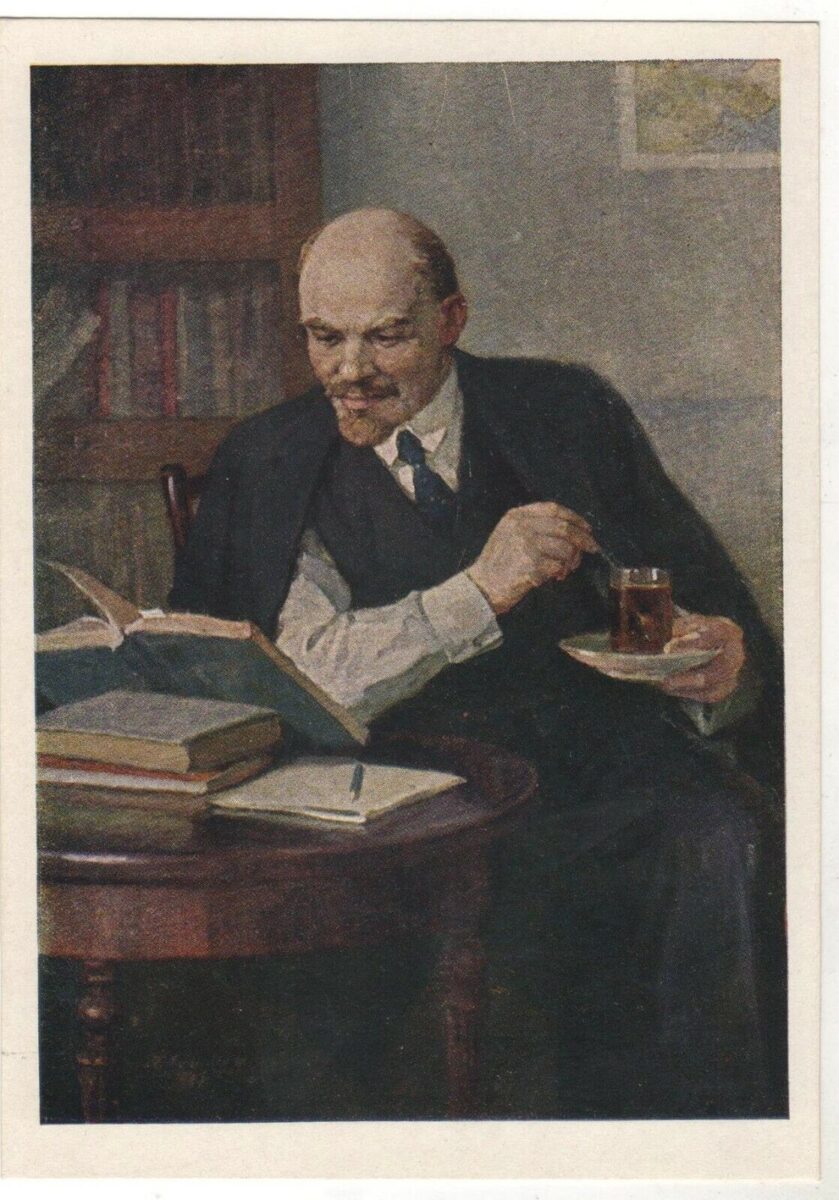This book Lenin, Hegel, and Western Marxism: A Critical Study is a modern classic, updated for this new edition published in the Historical Materialism series by Brill. Kevin Anderson shows us not only how Lenin read Hegel, the German philosopher that Marx grappled with and used to develop his historical-materialist account of capitalism, but also why it matters to the history of Marxism. It is a detailed study and passionate argument for taking seriously a history of ideas that was lost.
Spirit
In the crucial years of exile before he returned to Russia to lead the revolution there in 1917, Lenin was spending less time in party-administration and sectarian point-scoring and much more time engaging in theoretical work, and that included a careful reading of Hegel to work out where Marx was coming from and what he did to transform Hegel’s idealist account of human history into a materialist one.

For Hegel, history unfolded through the dialectical progression of “Spirit”, clearly an idealist conception of historical processes, and this was traced through a kind of a version of “phenomenology” that was focused on cultural processes as manifestations of the underlying quasi-spiritual development of humanity that Hegel was concerned with. What this also had buried in it, however, and here was something that Marx found really useful, was Hegel’s attention to contradiction. Things do not simply unfold smoothly, but through ruptures, breaks, dialectical leaps in which changes over time suddenly take on a revolutionary aspect.
Marx read Hegel as someone who was onto something, but had things, as it were, upside down, and so aimed to stand him the right way up; instead of an idealist account, change occurring in the realm of ideas or at the level of “Spirit”, Marx took the dialectical account of contradiction and revolution and reworked it as happening in the world, in the economy, in class struggle.
Suppression
Now, as Anderson clearly shows, there are two ways of re-reading Marx’s reading of Hegel. One way is to simply replace Hegel’s phenomenological story with a “materialist” one, gutting Hegel’s careful analysis and turning it into some kind of mechanistic one; then, for instance, you have the unrolling of economic “stages” – slavery to feudalism to capitalism and then to socialism – that was used by Stalin to hold back revolution in alliance with feudal and supposedly “underdeveloped” capitalist powers in different parts of the world, and you have all of the so-called “dialectical materialist” orthodoxy, hallmarks of Stalinism in the realm of theory.
Here Engels was enrolled by the Stalinists to back up that kind of replacement of Hegelian “idealism” with “scientific socialism”, and many of Engels’ formulations do lend themselves to that kind of crude “materialism”, a kind of materialism that then effectively functions as a kind of worldview or even official faith of the bureaucracy in the Soviet Union.
During the late 1920s, after Lenin’s death, and through the 1930s, including in the show-trials in which Stalin and his henchmen dispatched political opponents and anyone suspected of theoretical deviation from the official line, the Stalinist theoreticians actually, Anderson reminds us, indulged in what Lenin himself very clearly denounced as “crude” or “stupid” or “silly” materialism. In fact, Anderson shows us that the bureaucracy suppressed what they knew of Lenin’s own reading of Hegel.
Clever idealism
Anderson takes us step-by-step through Lenin’s philosophical notebooks on Hegel, and his argument is in line with Lenin’s own insistence that to understand Marx it was necessary to read Hegel; “We must”, Lenin writes, “organise a systematic study of the Hegelian dialectic from a materialist standpoint”. Anderson’s fine-grained reading, explicating passages in Hegel that Lenin copies out in his own notebooks, is so detailed as to sometimes appear pedantic, but that pedantic reading is driven by a passionate belief that Hegel had something crucial to offer Marx and then Lenin.
There are moments in Lenin’s notebooks when Lenin is clearly exasperated by some of Hegel’s religious terminology, but he seizes on those moments in the text when Hegel is providing a kind of “clever idealism” that is closer to Marxism, Lenin argues, than crude reductionist pretend-materialism. There are also moments in Anderson’s book when he does seem to be bending the stick a little too far, and he comments quite a few times that Lenin is “skipping” passages in Hegel’s work that he should have taken more care over.

Anderson’s own passion for Hegel and so for a Hegelian Marxism – the “Western Marxism” he is signalling in the title of his book – is inspired by his working relationship with Raya Dunayevskaya, an avowed Hegelian “humanist” Marxist who herself had no problems with the mystical language you find in Hegel’s work. In fact, Anderson tells the story of Lenin’s reading of Hegel in early sections of the book in such a way as to anticipate and confirm what Dunayevskaya herself says about it.
Dangers
Dunayevskaya was, aficionados of the internal history of Trotskyism will know, “Freddie Forest” of the Johnson-Forest tendency inside the Fourth International, FI, in the late 1940s and then outside it in the early 1950s. “Johnson” was the black Caribbean revolutionary CLR James. Trotsky himself doesn’t come out of Anderson’s book very well, and although Trotsky wrote about dialectics, and used his reading of Marx to settle scores with opponents inside and outside the FI, he was not, in Anderson’s view a philosophical heavyweight.
There is always a danger, of course, and in Anderson’s view Trotsky was guilty of this, of falling into precisely the kind of reductionist “materialist” alternative to Hegelian idealism that the Stalinists engaged in. And there is a flipside of that danger, which is to get bogged down in some kind of quasi-theological gobblydegook reading, something we have seen inside Trotskyism in the work of Gerry Healy; members of the WRP had to attend lectures which were completely mystifying as Healy waffled on about the mysteries of the dialectic.
To be honest, I felt that Anderson was also at risk of falling into this flipside danger, and some of the quotes from his mentor Dunayevskaya are really quite mystifying, as are some of the quotes from Hegel that Anderson wanted Lenin to pay more attention to.
Consequences
Where Anderson is more convincing, and really useful, is in his account of what Lenin did with Hegel’s ideas in practice. There are two places they cash out in practice. One is in Lenin’s writings on the state in State and Revolution, where, according to Anderson, it was Hegel’s insistence on contradiction, on dialectics, that led Lenin to shift from simply wanting to seize hold of the state apparatus to demanding that the state be “smashed”. There was, in the process, a new emphasis in Lenin’s work on the self-activity of the working-class, and the argument that the working class build forms of organisation that are qualitatively different from the operations of the capitalist state.
The other place these ideas manifest themselves, Anderson argues, is in Lenin on Imperialism, the Highest Stage of Capitalism, in which there is attention to what Anderson calls the emergence of “new revolutionary subjects”. Against other Marxists, such as Rose Luxemburg, Lenin argued for the rights of the colonial oppressed to engage in their own liberation struggles against imperialism and against the capitalist state of their own dependent nations. There was, for example, specific attention paid to the unfolding possible revolution in Ireland in 1916.
Those notions, of independent self-activity of the working class and of self-conscious revolutionary movements against colonialism, were important to the Johnson-Forest Tendency and to CLR James in particular, and they were also important inside the Fourth International in the practical solidarity activities of Michel Pablo with the Algerian revolution and very favourable reviews by Pablo of the writings of Frantz Fanon.
Ideas and practice
Again, Anderson’s passion for a Dunayevskaya-style reading of Marxism, turning it back towards Hegel, is, I think, too strong, overplayed, and it would be quite possible to see Lenin’s attention to the state and colonialism as flowing from his grounded involvement in revolutionary Marxist politics rather than in what he read in Hegel. Even so, the story Anderson spins is a good one, and it does draw attention to Lenin as a thoughtful appreciative reader of work he did not entirely agree with, learning from it and, in the process, working in the best spirit of constructive Marxist dialectical engagement with theory as well as practice.
Art Book Review Books Capitalism China Climate Emergency Conservative Government Conservative Party COVID-19 Creeping Fascism Economics EcoSocialism Elections Europe Event Video Far-Right Fascism Film Film Review France Gaza Global Police State History Imperialism Israel Italy Keir Starmer Labour Party London Long Read Marxism Marxist Theory Migrants NATO Palestine pandemic Protest Russia Solidarity Statement Trade Unionism Trans*Mission Ukraine United States of America War

